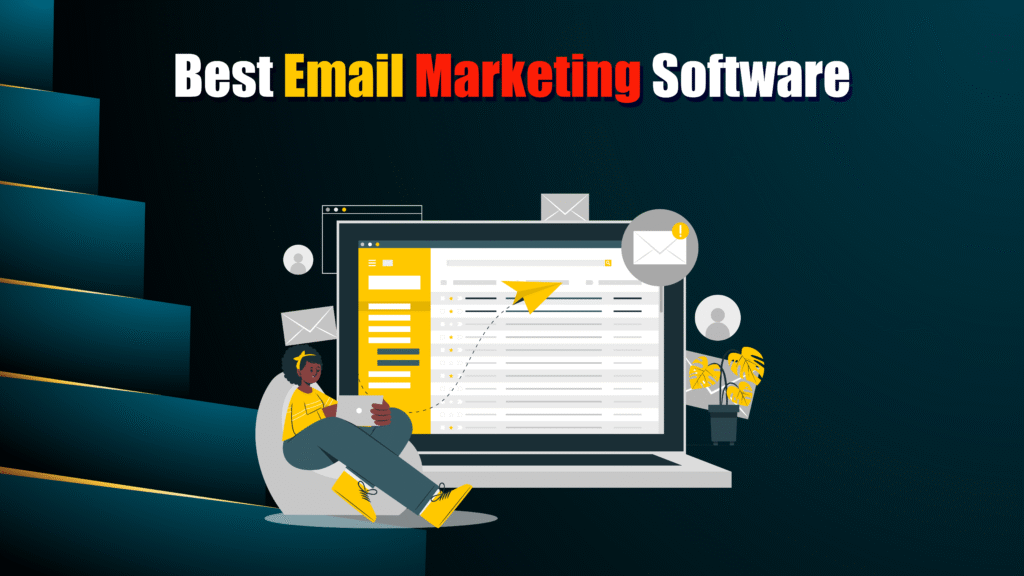Choosing the right email marketing software is essential for creating engaging campaigns, driving sales, nurturing leads, and automating customer communication. Whether you’re a small business owner, digital creator, or a large enterprise, using the right platform can help you build meaningful customer relationships and scale your marketing efforts effectively.
Today’s top email marketing software platforms offer cloud-based functionality, advanced automation, drag-and-drop builders, CRM integration, A/B testing, segmentation, analytics, and compliance with email regulations like CAN-SPAM. Many of these tools also support omnichannel marketing, helping you combine emails with SMS, landing pages, and social campaigns under one dashboard.
To help you make a smart decision, we’ve researched and ranked the 15 best email marketing software platforms in 2026, based on features, automation capabilities, ease of use, pricing, scalability, integrations, and user feedback.
Here’s a quick snapshot of the top picks:
- GetResponse – Best for webinars and marketing funnels
- HubSpot – Best for advanced marketing automation and CRM integration
- ActiveCampaign – Best for customer experience and email automation
- Constant Contact – Best for ease of use and customer support
- Klaviyo – Best for eCommerce-focused businesses
- Mailchimp – Best all-in-one platform for small businesses
- ConvertKit – Best for creators, bloggers, and influencers
- MailerLite – Best for budget-conscious small businesses
- Drip – Best for eCommerce automation and segmentation
- Campaign Monitor – Best for beautifully designed email campaigns
- Brevo (formerly Sendinblue) – Best for transactional and marketing emails
- AWeber – Best for small businesses and email beginners
- Campaigner – Best for multichannel marketing
- Benchmark Email – Best for quick setup and ease of use
- Zoho Campaigns – Best for integration with Zoho ecosystem
Before You Continue…
Before choosing the best email marketing software in the USA, it’s important to assess your business type, marketing goals, and audience size. Identify whether you need automation, CRM integration, eCommerce support, or just a basic newsletter tool. Match your needs with platform features such as campaign automation, lead segmentation, compliance options, and integration with tools like Shopify, WordPress, or Salesforce.
Questions to Ask When Choosing the Right Email Marketing Software
- Does the platform support automation and segmentation?
Smart automation and segmentation features help personalize emails and boost engagement by targeting the right audience with the right message. - Can it integrate with your existing CRM, eCommerce, or CMS tools?
Ensure the platform works smoothly with your current tools like WooCommerce, Shopify, or HubSpot for streamlined workflows. - Is it beginner-friendly and scalable as your business grows?
Look for a tool that’s easy to use but also powerful enough to grow with your email list and marketing needs. - Does the software offer compliance with U.S. email laws like CAN-SPAM?
Ensure the platform includes tools for unsubscribe management, legal compliance, and consent tracking. - Are advanced analytics and reporting available?
Real-time performance tracking helps optimize campaigns and understand subscriber behavior for better results.
Differences in Pricing and Pricing Models
Pricing is a crucial factor when selecting email marketing software in the USA, especially for startups, solo creators, and small to medium-sized businesses. Providers use different models—some charge based on the number of contacts, emails sent per month, or features available in each tier—making direct comparison a bit challenging. It’s essential to choose a pricing model that aligns with your email volume, automation needs, and growth plans.
Pricing Comparison for Small Teams and Startups
For small businesses or individuals just starting out, platforms like MailerLite, Mailchimp (Free Plan), and Brevo offer affordable or even free tiers. These plans typically include basic email templates, campaign scheduling, and reporting—making them perfect for basic newsletters and early lead generation. Paid plans often start around $10–$20/month and scale based on list size.
Pricing Comparison for Growing Businesses and Enterprises
For mid-sized businesses or companies needing advanced features, platforms like ActiveCampaign, HubSpot, and Klaviyo start around $30–$50/month. These tools provide advanced automation, segmentation, multichannel marketing, CRM integration, and dedicated support. For enterprise-level organizations, custom pricing is often available based on contact volume, feature bundles, and service level agreements (SLAs).
Want to dive deeper into the pricing models and the platforms themselves? Here’s a detailed breakdown of the top email marketing software in the USA for 2026:
1- GetResponse – Best for Comprehensive Marketing Solutions and Webinar Hosting
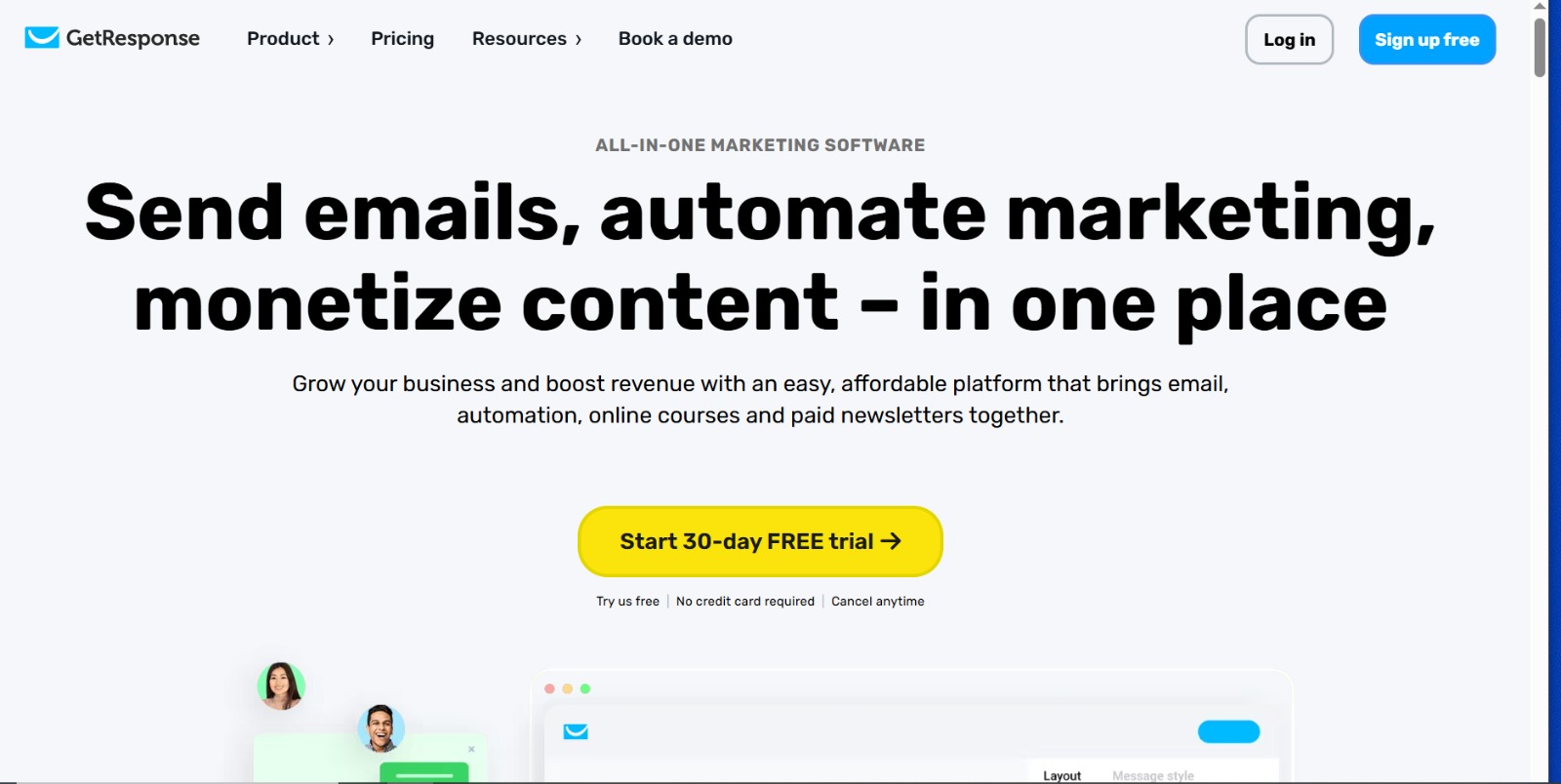
GetResponse is an all-in-one marketing platform that combines email marketing with powerful automation, landing pages, and webinar hosting capabilities. It’s a great choice for businesses looking to manage multiple marketing channels from one place. With easy-to-use tools and scalable plans, GetResponse supports small businesses to enterprises in driving leads and conversions.
Features
- Drag-and-drop email builder and automation workflows
- Built-in webinar hosting and registration tools
- Landing page and funnel builder
- Advanced list segmentation and targeting
- Integrates with CRM and eCommerce platforms
Reviews
Users appreciate GetResponse for its wide range of marketing tools in one platform, especially valuing the webinar feature. Some users find the interface slightly complex initially but recognize its power once mastered.
Pros
- Integrated webinar hosting
- Comprehensive marketing toolkit
- Scalable automation features
- Good customer support and tutorials
Cons
- Slight learning curve for beginners
- Some features behind higher-tier plans
- Occasional email deliverability issues reported
- Interface can feel cluttered
Final Verdict
GetResponse is a versatile solution perfect for businesses needing a blend of email marketing, automation, and webinar capabilities. While it may require some time to master, it’s all-in-one approach provides excellent value for growing businesses.
2- HubSpot – Best for Advanced Marketing Automation and CRM Integration

HubSpot is a powerful marketing platform known for its robust CRM integration and advanced automation features. It’s perfect for businesses that want to combine email marketing with sales, customer service, and inbound marketing in one unified system. HubSpot offers a rich set of tools for lead nurturing, segmentation, and personalized campaigns, making it a favorite among medium to large businesses.
Features
- Deep CRM integration with sales and service tools
- Advanced email automation and workflows
- Personalization and dynamic content capabilities
- In-depth reporting and analytics dashboard
- Seamless integration with CMS, social media, and ad platforms
Reviews
Users love HubSpot for its all-in-one marketing and sales approach, enabling better alignment across teams. The automation features and detailed analytics are highly praised, though some mention the learning curve and higher price point as considerations.
Pros
- Comprehensive CRM and marketing suite
- Highly customizable automation workflows
- Excellent reporting and attribution tools
- Strong support and training resources
Cons
- Expensive for smaller businesses
- Steeper learning curve compared to simpler tools
- Some features locked behind premium plans
- Can be overwhelming for beginners
Final Verdict
HubSpot stands out as the best choice for businesses seeking advanced automation and CRM integration under one roof. While it may be pricier and more complex than basic tools, its comprehensive features and scalability make it ideal for growing companies focused on inbound marketing and sales alignment.
3- ActiveCampaign – Best for Powerful Automation and CRM Integration
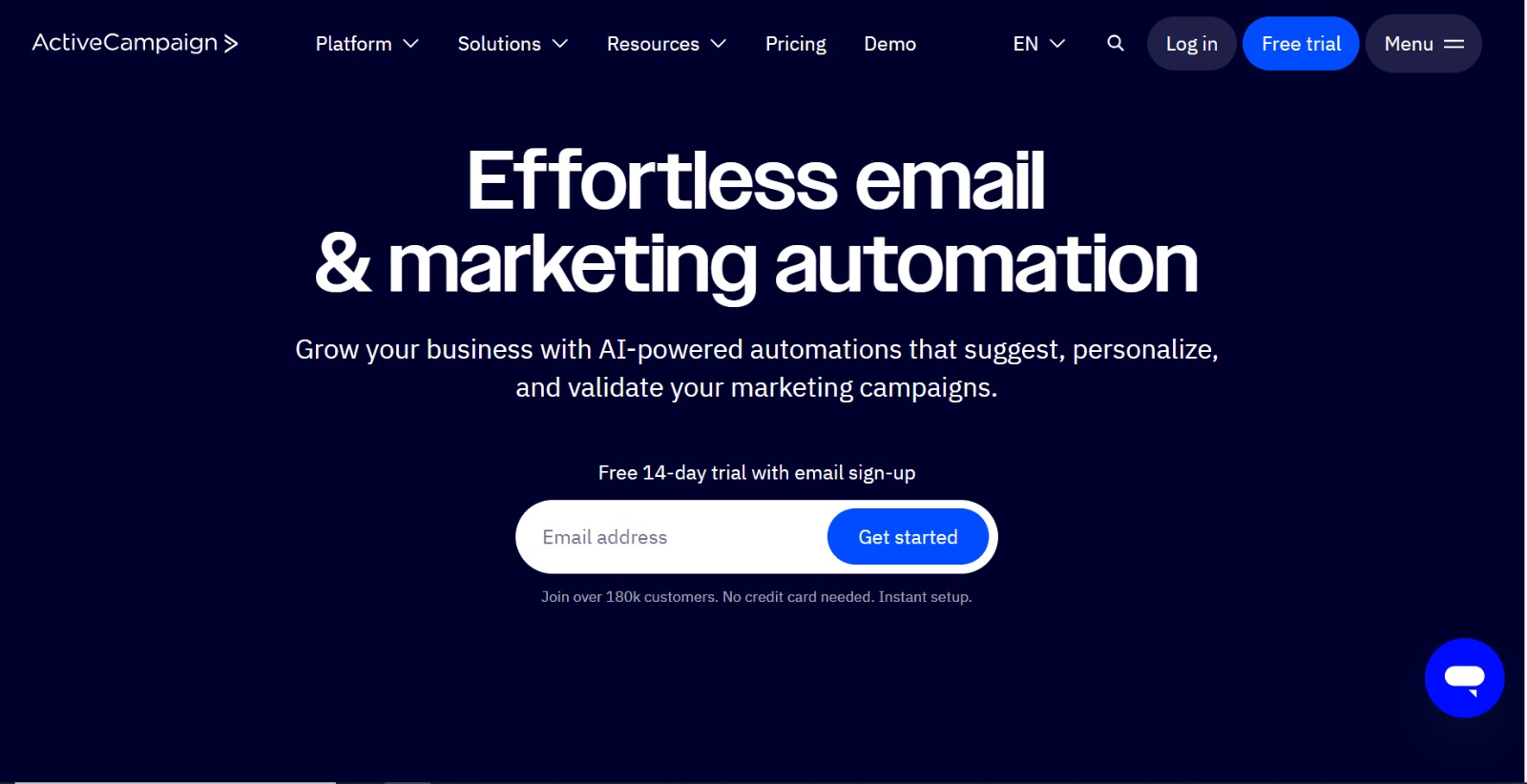
ActiveCampaign is a robust email marketing platform that combines advanced automation with a built-in CRM, making it ideal for businesses focused on nurturing leads and managing customer relationships. It offers sophisticated workflows, personalized messaging, and sales automation tools, catering to both small businesses and enterprises.
Features
- Advanced marketing automation and drip campaigns
- Integrated CRM and sales automation
- Personalization and dynamic content
- Email segmentation and lead scoring
- Integrations with popular apps and eCommerce platforms
Reviews
Users highlight ActiveCampaign’s flexibility and powerful automation capabilities, praising its ability to create complex workflows without coding. Some find the interface complex initially, but most agree the platform offers excellent value for nurturing customer relationships.
Pros
- Highly customizable automation workflows
- Built-in CRM for sales and marketing alignment
- Comprehensive segmentation and personalization
- Strong integration ecosystem
Cons
- Learning curve for beginners
- Pricing can increase with added contacts and features
- Email template editor has limited flexibility
- Some advanced features require higher-tier plans
Final Verdict
ActiveCampaign is perfect for businesses that want to combine email marketing with CRM-driven sales automation. Its powerful automation and lead management tools make it a strong contender for companies focused on growth and customer engagement.
4- Constant Contact – Best for Event Marketing and Small Businesses
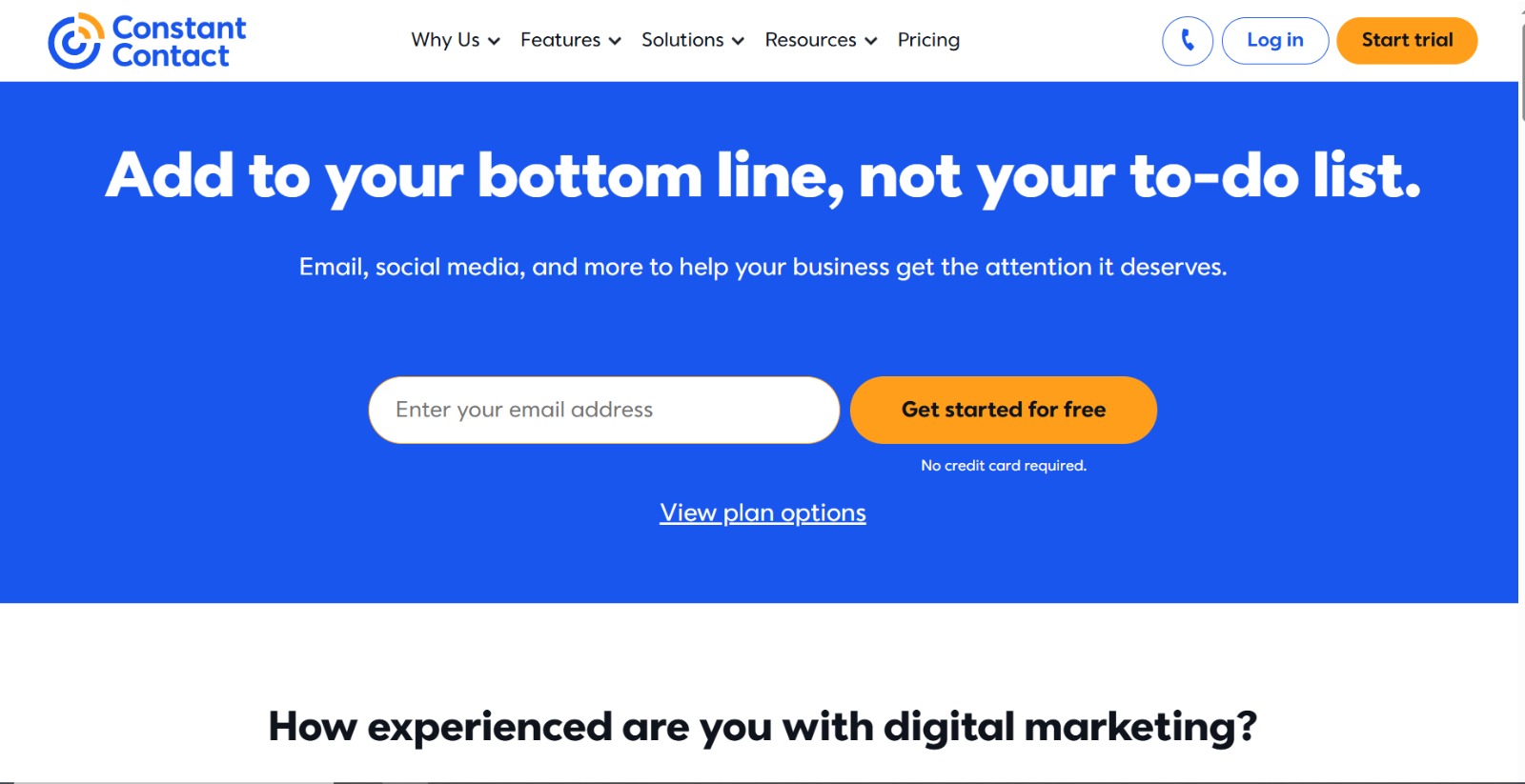
Constant Contact is a user-friendly email marketing platform designed to help small businesses grow their audience and engage customers effectively. It’s especially known for its strong event marketing tools, including easy event invitations and registrations. Constant Contact offers a range of customizable templates, automation, and list-building features ideal for local businesses and nonprofits.
Features
- Easy-to-use email editor with hundreds of templates
- Event marketing tools with invitations and RSVP tracking
- Automated welcome emails and drip campaigns
- Contact management and list segmentation
- Integration with eCommerce and social media platforms
Reviews
Users appreciate Constant Contact’s simplicity, customer support, and event-focused features. Many find the interface straightforward for beginners, though some note the limited advanced automation compared to competitors.
Pros
- Excellent event marketing capabilities
- User-friendly interface
- Reliable customer support
- Integrates with popular eCommerce and social tools
Cons
- Limited automation features
- Pricing can be higher than some alternatives
- Basic reporting compared to advanced platforms
- Fewer template customization options
Final Verdict
Constant Contact is a strong choice for small businesses and organizations that prioritize event marketing and easy email management. While it may lack some advanced automation, its simplicity and support make it a dependable option for beginners and local marketers.
5- Klaviyo – Best for Data-Driven eCommerce Marketing
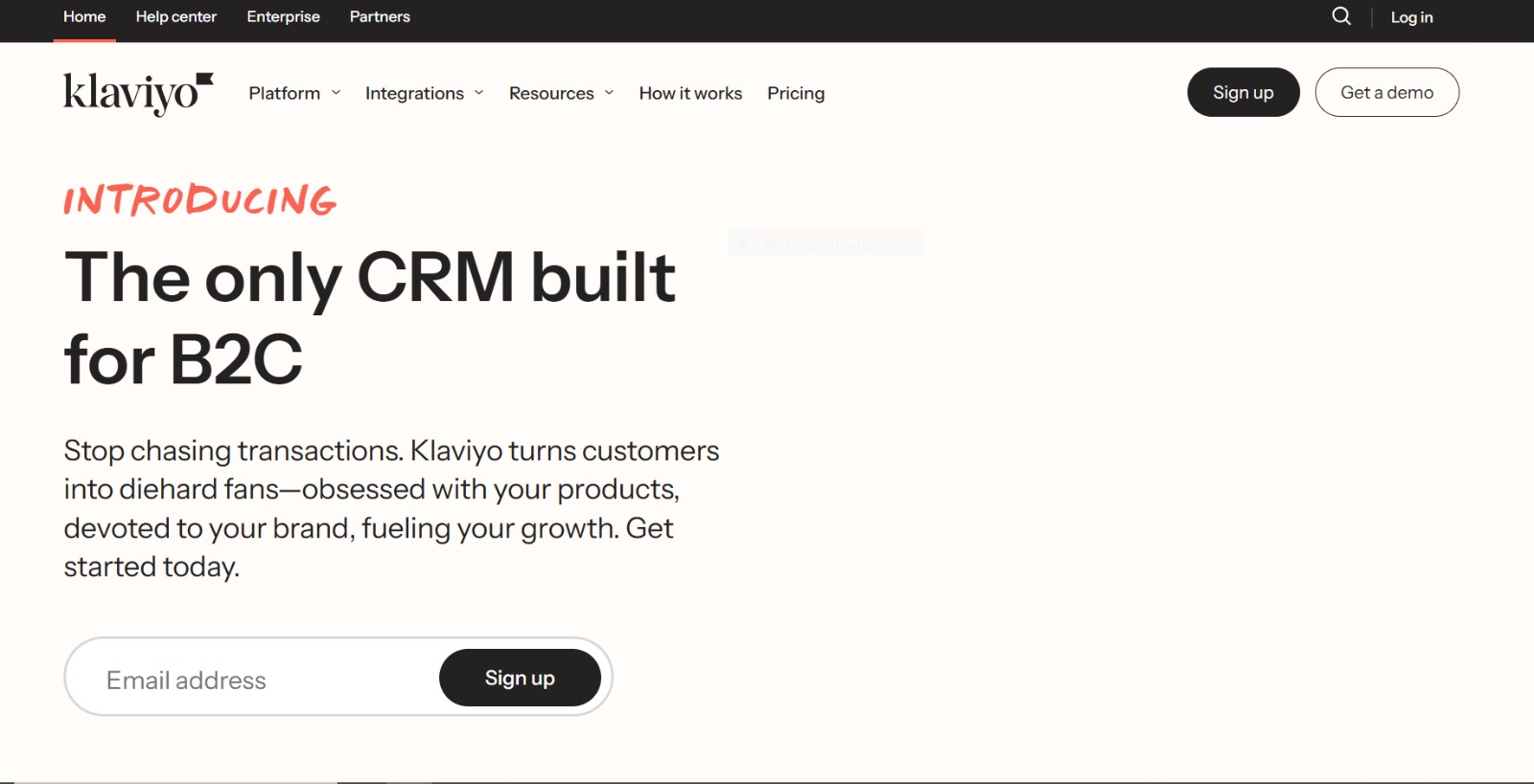
Klaviyo is a leading email marketing platform tailored specifically for eCommerce brands that want to leverage customer data for personalized marketing. It integrates deeply with eCommerce platforms like Shopify and BigCommerce, enabling highly targeted campaigns based on purchase behavior, browsing history, and customer lifetime value.
Features
- Advanced segmentation and personalized messaging
- Predictive analytics and customer lifetime value tracking
- Pre-built automation workflows for cart abandonment, welcome series, and more
- Integration with major eCommerce platforms and CRMs
- Real-time performance tracking and reporting
Reviews
Users praise Klaviyo for its powerful data-driven marketing tools and ease of integration with eCommerce stores. Some mention the pricing can rise quickly with list growth, but the ROI from targeted campaigns often justifies the cost.
Pros
- Excellent for personalized, data-driven campaigns
- Deep integrations with eCommerce platforms
- Strong automation and segmentation capabilities
- Robust analytics and reporting
Cons
- Pricing can be expensive for large lists
- Steeper learning curve for beginners
- Limited features outside eCommerce use cases
- Email template editor could be more flexible
Final Verdict
Klaviyo is the top choice for eCommerce businesses seeking to harness data for personalized marketing. Its advanced segmentation and analytics make it invaluable for driving revenue, though it may be less suitable for non-eCommerce companies or smaller budgets.
6- Mailchimp – Best All-in-One Platform for Small Businesses
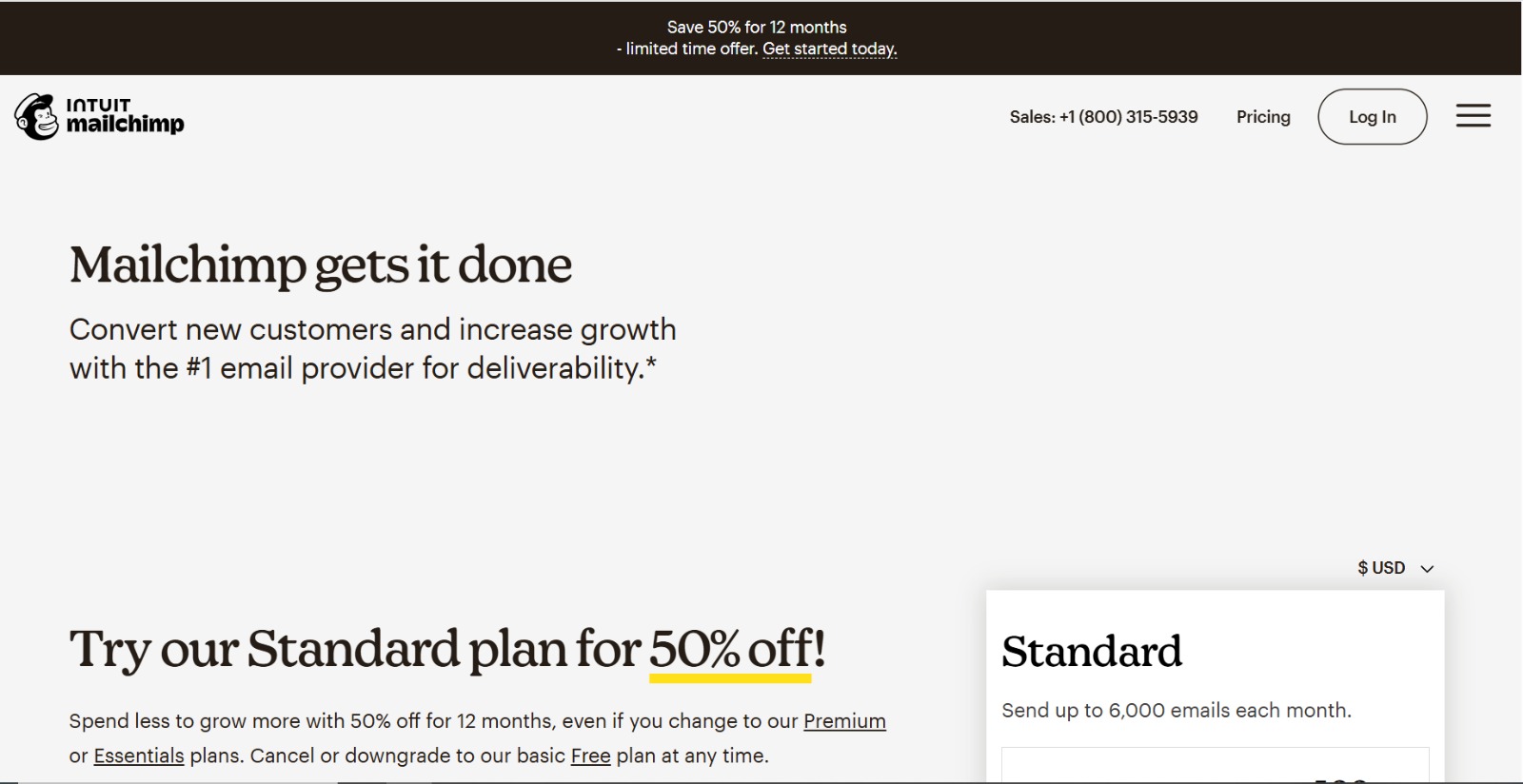
Mailchimp is one of the most widely used email marketing platforms in the USA, known for its beginner-friendly interface and all-in-one marketing features. It’s ideal for small to medium-sized businesses looking for email automation, analytics, and integration with CRMs, websites, and eCommerce platforms. With customizable templates, pre-built journeys, and detailed analytics, Mailchimp offers powerful marketing tools with minimal learning curve.
Features
- Drag-and-drop email builder with customizable templates
- Pre-built and custom automation workflows
- Audience segmentation and tags for targeting
- Real-time analytics and A/B testing
- Integrates with Shopify, WordPress, Salesforce, and more
Reviews
Users appreciate Mailchimp for its ease of use, flexible pricing for small teams, and strong branding tools. Many mention that the drag-and-drop builder is intuitive, and the automation is sufficient for growing brands. Some, however, feel advanced features are locked behind higher-tier plans.
Pros
- Free plan available for small lists
- Excellent analytics and email editor
- Smooth integration with major platforms
- Easy to launch campaigns quickly
Cons
- Limited automation in lower-tier plans
- Pricing increases significantly with list size
- Templates can feel restrictive to some users
- Customer support may require paid plans
Final Verdict
Mailchimp is an excellent choice for small businesses and beginners looking for a simple yet scalable email marketing tool. While advanced users may seek deeper automation elsewhere, its accessible features, smart recommendations, and broad integrations make it a top pick for all-around email marketing.
7- ConvertKit – Best for Creators, Bloggers, and Influencers

ConvertKit is an email marketing platform tailored for digital creators, including bloggers, YouTubers, authors, and coaches. It focuses on simplicity, clean design, and automation tools that help users build meaningful relationships with their audience. The platform allows creators to easily build email funnels, manage subscribers through tagging, and monetize their content through integrated tools like landing pages, sign-up forms, and paid newsletters.
Features
- Visual automation builder for funnels and sequences
- Landing pages and opt-in forms
- Tag-based subscriber management
- Creator-friendly integrations (Teachable, Patreon, etc.)
- Email templates optimized for simplicity and clarity
Reviews
ConvertKit is highly praised by content creators for its ease of use, clean email design, and audience segmentation tools. However, users mention that it may lack some of the advanced design options and reporting features found in more corporate-focused platforms.
Pros
- Built specifically for digital creators
- Excellent automation and tagging system
- Intuitive and beginner-friendly
- High deliverability rates
Cons
- Limited design customization options
- Fewer integrations than larger platforms
- Reporting features are somewhat basic
- Can be costly as subscriber count grows
Final Verdict
ConvertKit is ideal for creators looking to grow their audience and revenue through email. With simple automation, strong segmentation, and easy content delivery tools, it’s one of the top choices for bloggers and influencers.
8- MailerLite – Best for Budget-Conscious Small Businesses
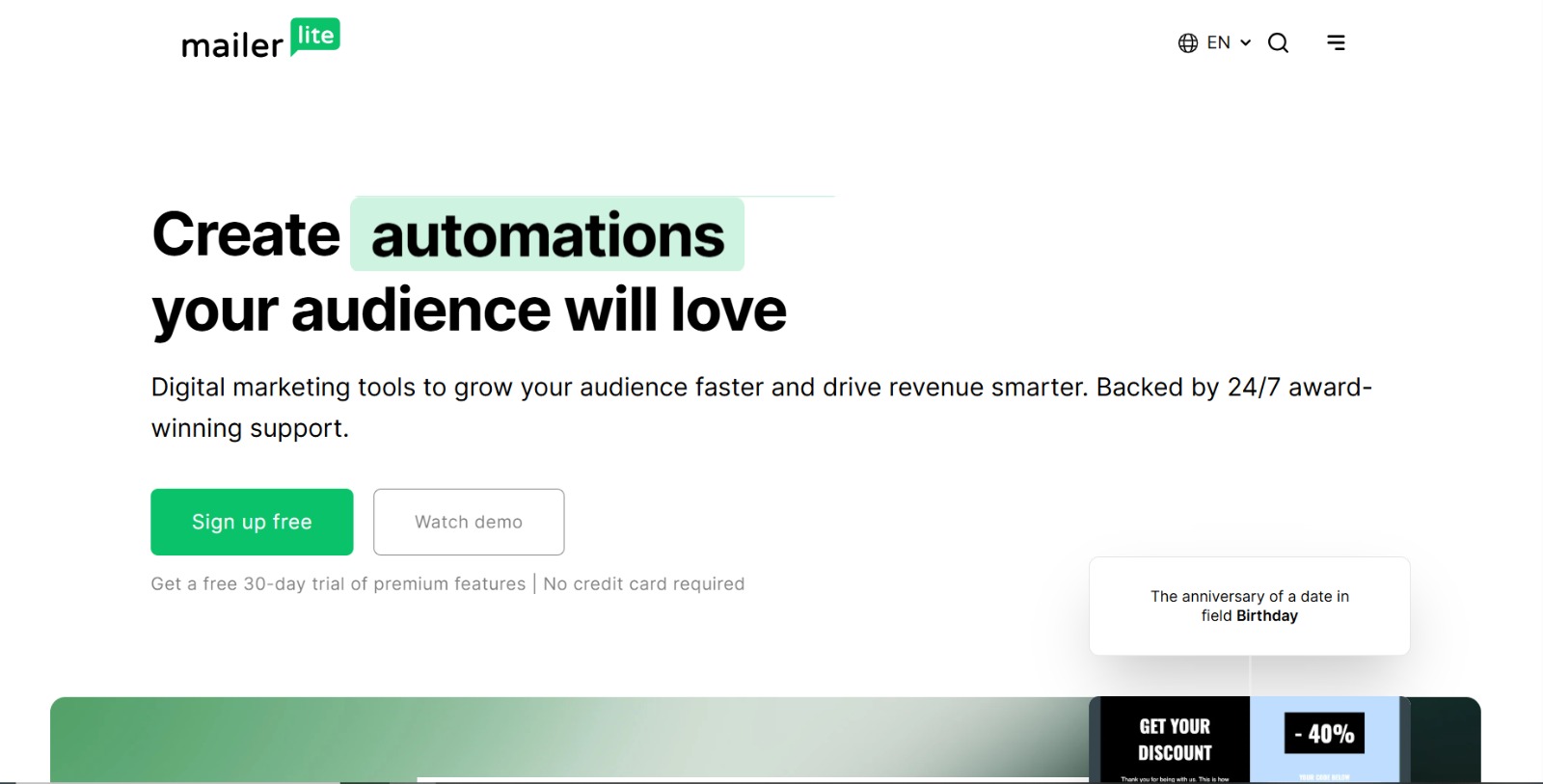
MailerLite is a user-friendly and cost-effective email marketing solution designed for small businesses, startups, and solo entrepreneurs. It offers a solid range of features without overwhelming users, making it ideal for those who need core email marketing tools at a lower price point. With a clean interface, built-in drag-and-drop editor, and automation capabilities, MailerLite delivers excellent value for those starting out or operating on a tight budget.
Features
- Drag-and-drop email editor
- Advanced automation and workflows
- Landing pages, pop-ups, and forms
- A/B testing and campaign reporting
- Integrations with Shopify, WordPress, and more
Reviews
MailerLite is widely appreciated for its affordability, simplicity, and high deliverability rates. Many users find it perfect for beginners and growing businesses, though a few mention limitations in design flexibility and third-party integrations.
Pros
- Affordable pricing with a generous free plan
- Simple and intuitive user interface
- Strong automation for the price
- Responsive customer support
Cons
- Limited design and template options
- Fewer advanced features for larger businesses
- Basic reporting compared to premium tools
- Approval process may delay account access
Final Verdict
MailerLite is a fantastic choice for small businesses or individuals looking for reliable email marketing without breaking the bank. Its combination of ease, affordability, and essential tools makes it a go-to platform for budget-conscious marketers.
9- Drip – Best for E-commerce CRM and Personalization

Drip is an email marketing platform designed especially for eCommerce businesses, combining marketing automation with powerful CRM features. It helps online stores deliver personalized customer experiences through behavior-based workflows, segmentation, and detailed tracking.
Features
- Advanced marketing automation tailored for eCommerce
- Customer data tracking and segmentation
- Multi-channel marketing including email and SMS
- Visual workflow builder
- Integration with major eCommerce platforms like Shopify and WooCommerce
Reviews
Users appreciate Drip for its eCommerce focus and ability to create highly personalized campaigns. Some find the interface a bit complex at first, but value the detailed insights and automation it provides.
Pros
- Strong eCommerce CRM features
- Highly customizable automation workflows
- Excellent integration with online stores
- Detailed customer tracking and analytics
Cons
- Steeper learning curve for beginners
- Pricing can be high for smaller businesses
- Limited pre-built templates
- Email editor could be more flexible
Final Verdict
Drip is a top choice for eCommerce businesses wanting to leverage CRM-driven marketing automation. Its personalized approach helps increase customer engagement and sales, though it may require some time to master.
10- Campaign Monitor – Best for Beautiful Email Designs and Personalization
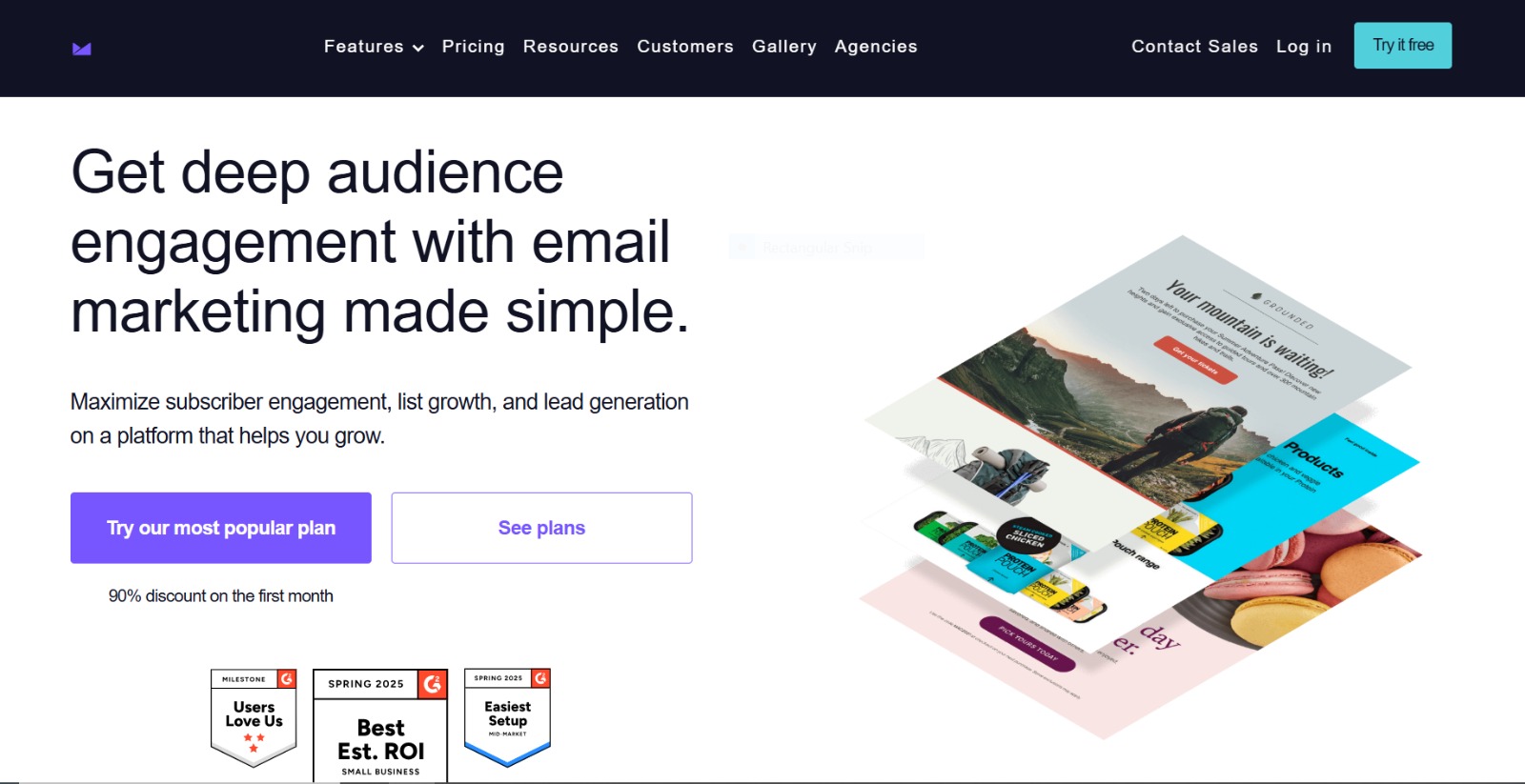
Campaign Monitor is known for its focus on creating visually stunning emails with ease. It offers a user-friendly drag-and-drop builder and advanced personalization options that help businesses connect with their audiences through targeted, relevant content. It’s a solid choice for marketers who want stylish emails with powerful segmentation.
Features
- Drag-and-drop email builder with customizable templates
- Advanced personalization and dynamic content
- Robust segmentation and targeting tools
- Automation workflows for customer journeys
- Comprehensive analytics and reporting
Reviews
Users love Campaign Monitor for its beautiful design templates and ease of use. The personalization and segmentation tools are praised, though some users find the pricing on the higher side for smaller businesses.
Pros
- Stunning, easy-to-use email templates
- Strong personalization features
- Detailed segmentation and targeting
- Reliable automation options
Cons
- Pricing can be expensive for small businesses
- Limited CRM features compared to competitors
- Some users report occasional deliverability issues
- Fewer integrations than some other platforms
Final Verdict
Campaign Monitor is perfect for businesses that prioritize email design and personalization to engage their audience. It offers elegant templates combined with robust segmentation, making it a great tool for marketers focused on creating visually impactful campaigns.
11- Brevo (formerly Sendinblue) – Best for Transactional and Marketing Emails
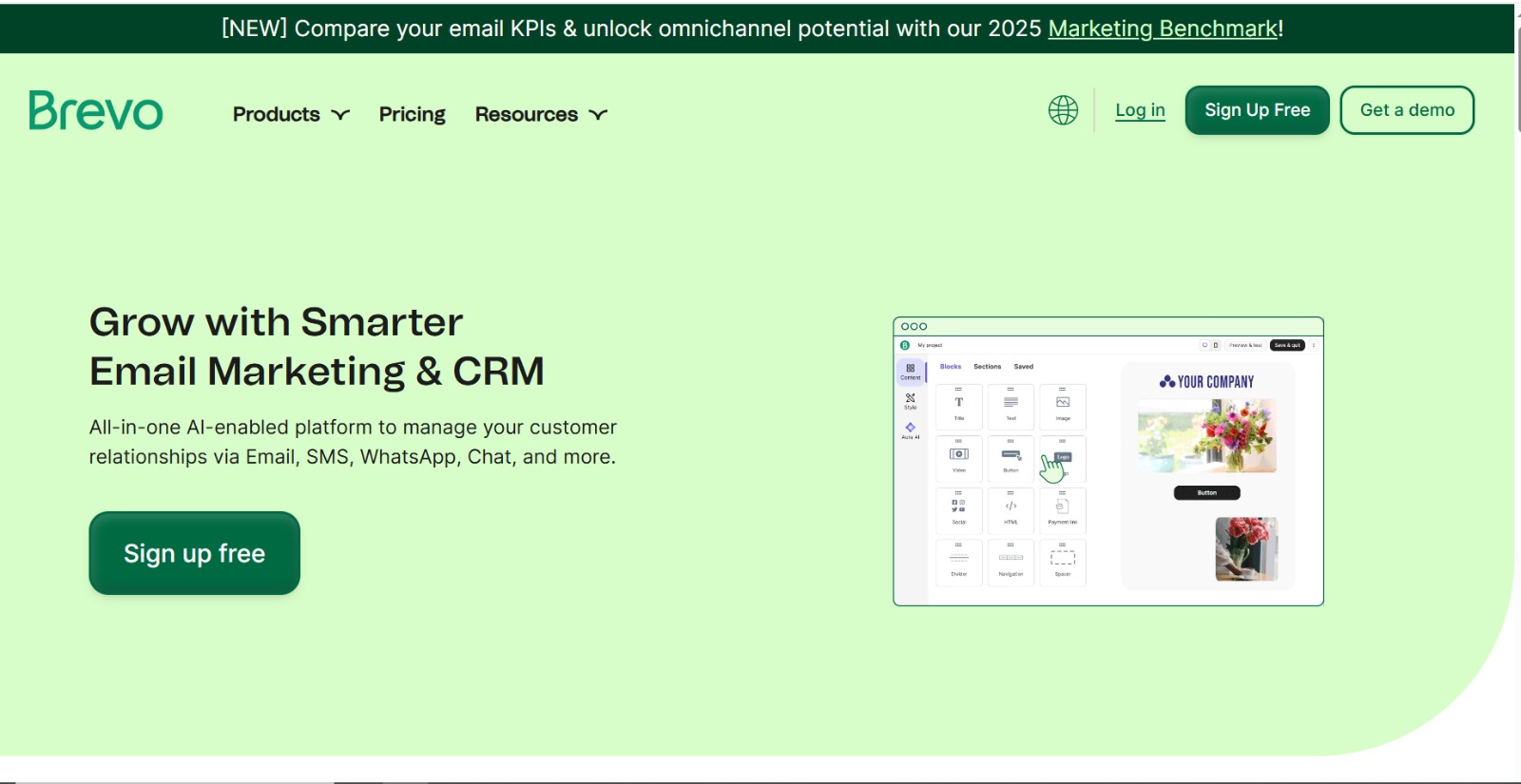
Brevo, previously known as Sendinblue, is a powerful all-in-one marketing platform that supports both marketing and transactional emails. Popular among small to medium-sized businesses, Brevo offers advanced automation, SMS marketing, CRM tools, and transactional email services—making it ideal for businesses that need both promotional and operational communication under one roof.
Features
- Email marketing and automation workflows
- SMS and WhatsApp campaigns
- Built-in CRM and live chat
- Transactional email capabilities (order confirmations, password resets)
- Real-time reporting and analytics
Reviews
Users appreciate Brevo for offering a comprehensive suite of tools at competitive pricing. It’s praised for its transactional email delivery and marketing automation features. However, some users mention a learning curve and limitations in template customization.
Pros
- Combines transactional and marketing emails
- Supports SMS and WhatsApp marketing
- Affordable plans with generous sending limits
- Advanced automation and CRM tools
Cons
- Slightly complex for beginners
- Template customization options can be limited
- Interface could be more intuitive
- Support response time may vary
Final Verdict
Brevo is a great fit for businesses that want to manage all customer communications—marketing, transactional, and SMS—in one place. With strong automation and competitive pricing, it’s a versatile platform ideal for growing digital operations.
12- AWeber – Best for Small Business Email Marketing and Support
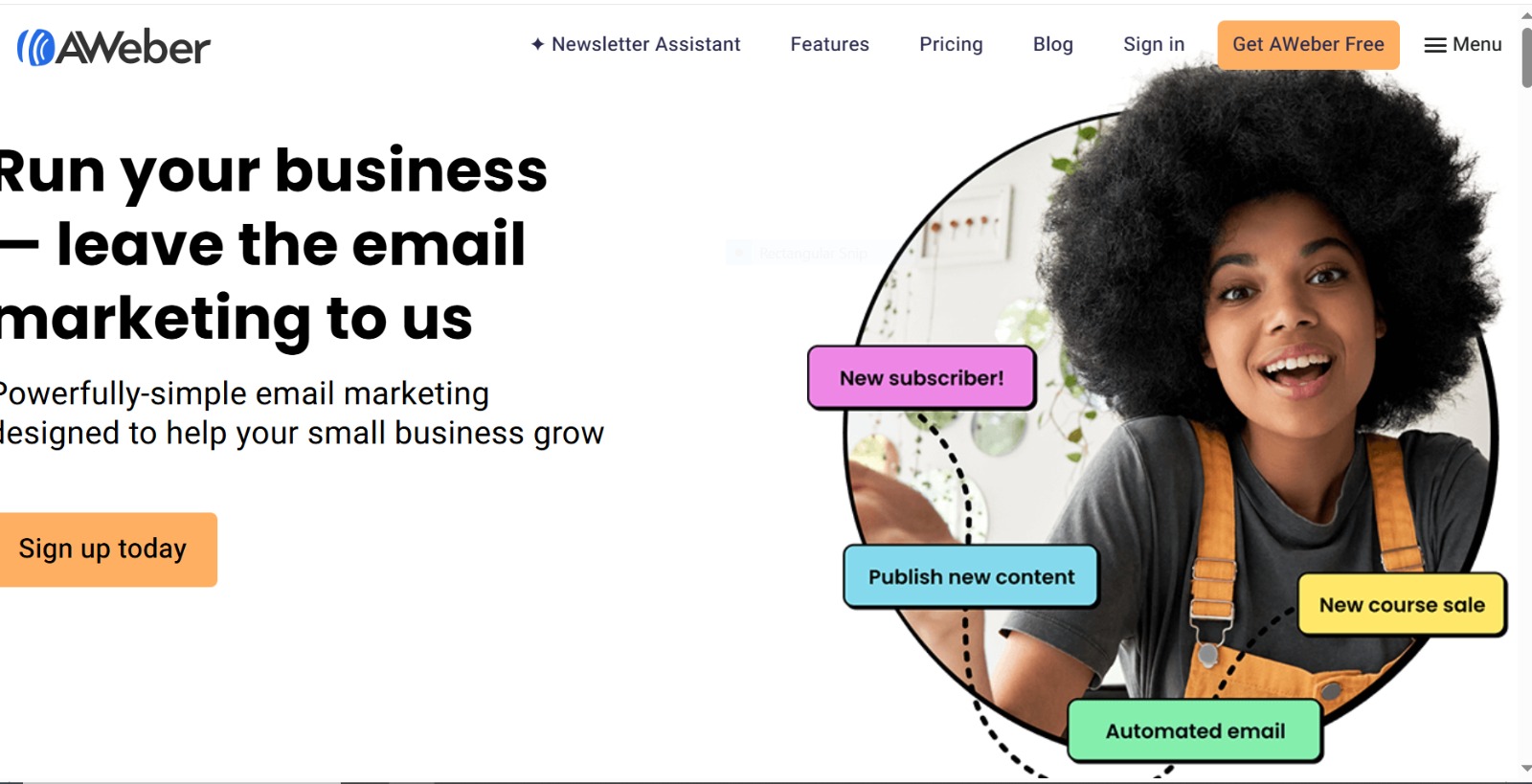
AWeber is a popular email marketing tool tailored for small businesses, known for its ease of use and strong customer support. It offers a solid range of templates and automation features designed to help small businesses create effective email campaigns without a steep learning curve.
Features
- Drag-and-drop email builder with customizable templates
- Email automation and autoresponders
- Subscriber segmentation and tagging
- Integrations with eCommerce platforms and social media
- Detailed analytics and reporting
Reviews
Users appreciate AWeber’s straightforward interface and responsive customer support. It is particularly praised for helping beginners get started with email marketing, although some advanced features are limited compared to bigger platforms.
Pros
- Easy setup and use for beginners
- Strong customer support
- Good selection of email templates
- Reliable automation and autoresponders
Cons
- Limited advanced automation options
- Pricing can be high for larger lists
- Fewer integrations than some competitors
- Email editor can feel outdated
Final Verdict
AWeber is ideal for small businesses and beginners seeking a reliable, easy-to-use email marketing solution with strong support. While it lacks some advanced features, it covers essential email marketing needs effectively.
13- Campaigner – Best for Advanced Automation and Personalization
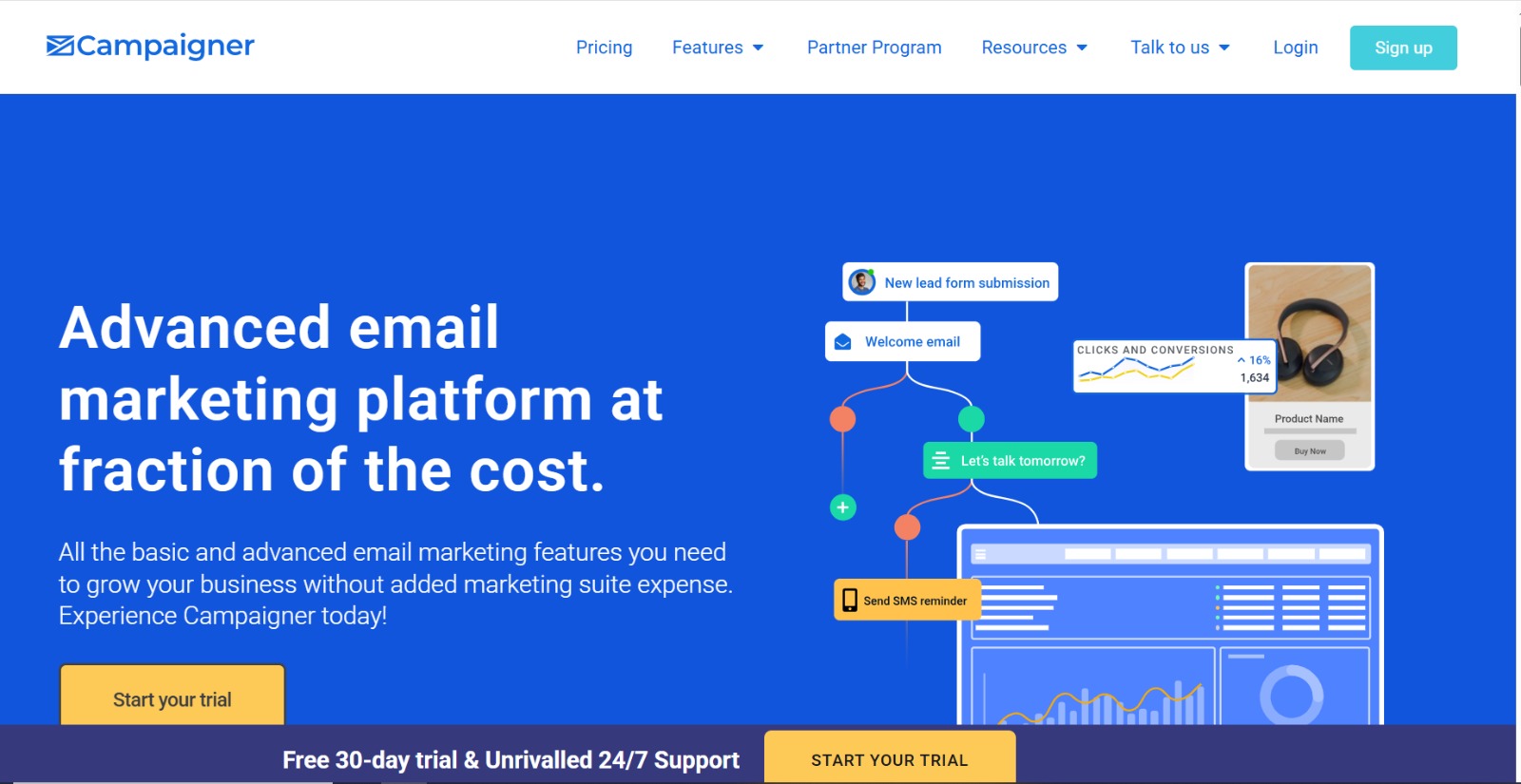
Campaigner is a powerful email marketing platform known for its advanced automation capabilities and deep personalization options. It’s designed to help businesses deliver targeted, relevant campaigns with dynamic content and behavior-triggered workflows.
Features
- Sophisticated email automation and drip campaigns
- Dynamic content personalization
- Behavioral tracking and segmentation
- A/B testing and detailed analytics
- Integrations with popular CRM and eCommerce platforms
Reviews
Users value Campaigner’s strong automation features and flexible personalization tools. Some users mention a steeper learning curve and an interface that could feel outdated, but overall it’s praised for driving effective email marketing campaigns.
Pros
- Robust automation and workflow options
- Deep personalization capabilities
- Comprehensive tracking and analytics
- Good integration options
Cons
- Steeper learning curve for new users
- User interface can be less intuitive
- Pricing on the higher side
- Limited template designs
Final Verdict
Campaigner is best suited for businesses that want to leverage powerful automation and personalization to increase engagement. It offers advanced features that reward users willing to invest time in mastering the platform.
14- Benchmark Email – Best for Quick Setup and Ease of Use

Benchmark Email is designed for speed, simplicity, and effective campaign creation. It’s a great choice for users who want to get started quickly with email marketing, offering a clean interface, responsive templates, and real-time editing. Ideal for small businesses and marketers who value efficiency over complexity, Benchmark makes launching campaigns fast and hassle-free.
Features
- Drag-and-drop email builder
- Pre-designed, mobile-responsive templates
- Real-time email editing and previews
- A/B testing and detailed analytics
- Integrations with eCommerce and CRM tools
Reviews
Benchmark is well-reviewed for its ease of use, especially for beginners or non-technical users. Users enjoy the fast campaign setup and clean UI. Some reviewers, however, mention that advanced marketers may find the features too basic for complex strategies.
Pros
- Intuitive interface, ideal for beginners
- Fast setup and user-friendly dashboard
- Responsive templates for mobile devices
- Free plan available with solid features
Cons
- Limited automation compared to competitors
- Fewer integrations than larger platforms
- Design flexibility can be restrictive
- Advanced features locked behind higher tiers
Final Verdict
Benchmark Email is best suited for users who want a quick and reliable email marketing solution without a steep learning curve. It’s perfect for small businesses that prioritize speed, simplicity, and good-looking campaigns.
15- Zoho Campaigns – Best for Integration with Zoho Ecosystem

Zoho Campaigns is part of the broader Zoho ecosystem, making it a powerful choice for businesses already using Zoho tools like Zoho CRM or Zoho Books. It combines strong automation capabilities with seamless integration across the Zoho suite, delivering a connected experience for email marketing, customer management, and analytics.
Features
- Drag-and-drop campaign builder
- List segmentation and A/B testing
- Pre-built and custom automation workflows
- Integrates tightly with Zoho apps
- Real-time analytics and reporting
Reviews
Zoho Campaigns earns praise for its affordability, automation, and native integration with other Zoho products. Users like how it fits naturally into the Zoho environment. Some users report a less intuitive interface and occasional bugs.
Pros
- Perfect for businesses using other Zoho tools
- Great automation and campaign tracking
- Cost-effective plans for growing teams
- GDPR-compliant with strong data protection
Cons
- Interface can be confusing at first
- Limited third-party integrations
- Occasional technical glitches
- Template design tools feel basic
Final Verdict
Zoho Campaigns is a great option for businesses already within the Zoho ecosystem. Its automation and seamless data sharing with other Zoho apps make it an efficient tool for managing email campaigns and customer relationships.
Frequently Asked Questions (FAQs)
What is the best email marketing software for small businesses?
Mailchimp and Constant Contact are popular choices for small businesses due to their ease of use, automation tools, and affordable pricing plans.
Which email marketing tool is best for eCommerce?
Klaviyo and Drip are excellent for eCommerce businesses, offering deep integrations with online stores and powerful automation for customer journeys.
Can I use these tools for free?
Yes, platforms like Mailchimp, MailerLite, and Benchmark Email offer free plans with basic features. These are ideal for beginners or businesses with smaller email lists.
Which software is best for advanced automation and CRM integration?
HubSpot and ActiveCampaign stand out with advanced automation, segmentation, and native CRM capabilities, making them great for scaling businesses.
Are these platforms compliant with data privacy laws like GDPR or CAN-SPAM?
Yes, most of the top email marketing software comply with GDPR, CAN-SPAM, and other data protection regulations. Always review each platform’s compliance tools before use.
